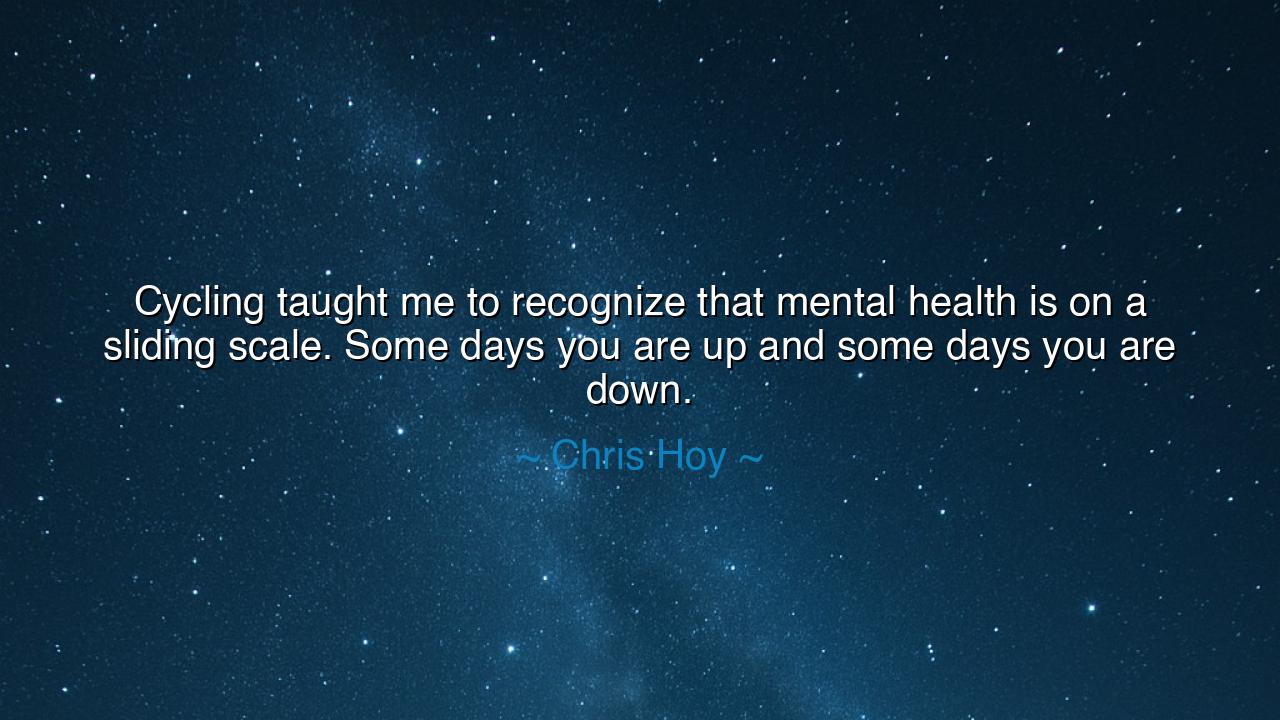
Cycling taught me to recognize that mental health is on a sliding
Cycling taught me to recognize that mental health is on a sliding scale. Some days you are up and some days you are down.






In the quiet strength of endurance and the rhythm of the turning wheel, Chris Hoy, champion of the velodrome and knight of perseverance, once spoke with humble clarity: “Cycling taught me to recognize that mental health is on a sliding scale. Some days you are up and some days you are down.” These are not the words of mere reflection but of deep human truth — for he who has conquered the physical world comes to understand that the greatest victories are not won upon the track, but within the mind. In this confession, Hoy reveals the essence of the human condition: that mental health is not a fixed mountain, but a landscape of peaks and valleys through which we must travel again and again.
The origin of these words lies not in triumph alone, but in the battle between strength and vulnerability that every athlete, every person, must face. For cycling, though it appears a sport of muscle and motion, is also a teacher of the spirit. On the road, one learns that the climb may break the body, yet the descent can restore it; that fatigue and renewal are bound together in eternal dance. So too it is with the mind — it rises and falls, swayed by storms unseen, yet always capable of renewal. Hoy’s wisdom was not born of philosophy, but of lived experience — the countless miles, the lonely training days, the silent races against self-doubt, and the realization that mental well-being is a journey, not a destination.
The ancients, though they had no bicycles, knew this truth well. The Stoics of Greece taught that the soul, like the sea, is ever in motion — sometimes calm, sometimes turbulent, but always shifting beneath the winds of circumstance. Epictetus said that we must learn to steer our inner ship, not to control the waves, but to endure them with grace. So when Hoy speaks of the sliding scale of mental health, he echoes the same timeless wisdom: that to live well is not to remain always high, but to understand the rhythm of rise and fall, to ride through both joy and sorrow with steady hand and open heart.
Consider the story of Sir Winston Churchill, who led his nation through the darkness of war, yet called his own depression his “black dog.” Though celebrated as a leader of unshakable resolve, he too knew the descent into despair, the long nights of heaviness that no medal or title could lift. Yet, like Hoy, he pressed on — acknowledging that strength is not the absence of struggle, but the courage to move through it. The cyclist and the statesman share the same truth: that life demands motion, even when the road turns steep or the light grows dim.
What Hoy teaches us through the metaphor of cycling is that awareness is the key to endurance. When one accepts that the mind, like the body, changes with time and strain, the burden of perfection is lifted. The wise do not demand constant happiness, for they know it is as unnatural as an unbroken summer. Instead, they learn to care for the mind — to rest when weary, to seek help when lost, and to trust that the descent will one day rise again. This understanding transforms suffering into patience, and patience into wisdom.
In a world that celebrates ceaseless performance, Hoy’s words stand as a quiet rebellion. He reminds us that even the strongest fall low, that even the victorious must tend to their inner wounds. There is no shame in struggle, for struggle is the soil of resilience. The body grows stronger when tested; so too does the mind, if it is met with compassion. The balance of health — mental, emotional, and physical — is not maintained by denial, but by honesty and care.
Let this, then, be the lesson for all who walk or ride the path of life: honor the cycle of your own being. When you are high, be grateful; when you are low, be gentle. Do not curse the valley, for it teaches what the mountaintop cannot — humility, endurance, and the strength to begin again. Remember that each day’s journey is but one turn of the wheel, and tomorrow may bring the wind at your back.
So, as Chris Hoy learned upon the road, so must we learn in our hearts: that mental health, like cycling, is not a race to be won, but a rhythm to






AAdministratorAdministrator
Welcome, honored guests. Please leave a comment, we will respond soon